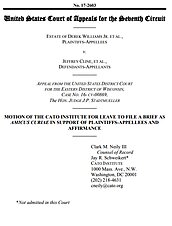Learn more about Cato’s Amicus Briefs Program.
On July 6, 2011, three Milwaukee police officers arrested Derek Williams Jr., pinning him to the ground and handcuffing him, with one of the officer’s knees pressed against the middle of his back. Mr. Williams stated three times — in a desperate voice that was recorded by the police radio transmission — that he could not breathe. Mr. Williams was eventually dragged out of the yard where he was arrested and thrown into a squad car, all while repeating his cries for help and saying he couldn’t breathe. In the squad car, Mr. Williams continued to beg for help, and eventually mouthed that he was going to die. Despite their knowledge (and direct observation) of his medical crisis, none of the officers called for aid during this time; shortly thereafter, Mr. Williams died in the squad car. Medical examiners later determined that the cause of death was sickle cell crisis, and that paramedics would have had several treatment options if they had been called in time.
Mr. Williams’ family members filed a civil rights lawsuits against these officers, alleging that they violated Mr. Williams’ Fourth Amendment rights by deliberately ignoring his requests for aid, even though they knew he was in serious medical distress. The defendants, however, invoked the defense of “qualified immunity,” arguing that even if they did violate Mr. Williams’ constitutional rights, they could not have reasonably been expected to know that intentionally ignoring someone dying in their custody was unlawful. Fortunately, and in a rare deviation from the usual trend in such cases, the district court denied immunity, and said that the case could proceed to trial. But the defendants, desperate to avoid a jury hearing the case, took advantage of the fact that qualified immunity permits defendants to appeal adverse decisions before trial — in contravention of the normal rule that appeals aren’t permitted until there’s a final decision below.
The Cato Institute has therefore filed an amicus brief with the Seventh Circuit, urging the court to affirm the denial of immunity, but also to address the legal infirmities with the doctrine in general. Qualified immunity was essentially invented out of whole cloth by the Supreme Court over the last half century. The text of our primary civil rights statute — usually called “Section 1983” after its place in the federal code — makes no mention of any immunity, and the common-law background against which it was adopted did not include any freestanding defense for public officials who acted unlawfully; on the contrary, the historical rule was that public officials were strictly liable for constitutional violations. In essence, qualified immunity has become nothing more than a “freewheeling policy choice” by the Court, at odds with Congress’s judgment in enacting Section 1983. This brief is part of Cato’s ongoing campaign to demonstrate that qualified immunity lacks any legal basis, vitiates the power of individuals to vindicate their constitutional rights, and contributes to a culture of near-zero accountability for law enforcement and other public officials.


